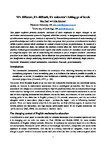It's different, it's difficult, it's unknown': Letting go of levels
| dc.contributor.author | Pratt, Nicholas | |
| dc.contributor.author | Alderton, J | |
| dc.date.accessioned | 2020-07-09T09:02:36Z | |
| dc.date.available | 2020-07-09T09:02:36Z | |
| dc.date.issued | 2017 | |
| dc.identifier.uri | http://hdl.handle.net/10026.1/15899 | |
| dc.description.abstract |
This paper explores primary teachers' accounts of their responses to major changes in the curriculum and assessment system in England, which has recently re-designated expected standards of achievement and progress. Analysis is informed by Foucauldian poststructural understandings of power/ knowledge and truth to examine how they reorganise their practices as mathematics teachers within a policy context which continues to compel schools to focus on performance. By means of a small-scale empirical study, we identify the tensions created when the 'rules of the game' change and how technological assessment tools require and enable teachers to reproduce levels and labels to categorise pupils. Our aim in undertaking this analysis is not to compare teachers' assessment practices to an ideal, beyond policy, but to illustrate how government-driven changes to assessment are insufficient to change underlying discourses of performativity which ultimately shape practice. | |
| dc.format.extent | 3580-3587 | |
| dc.language.iso | en | |
| dc.subject | assessment | |
| dc.subject | Elementary school mathematics | |
| dc.subject | Foucault | |
| dc.subject | governmentality | |
| dc.title | It's different, it's difficult, it's unknown': Letting go of levels | |
| dc.type | conference | |
| plymouth.author-url | https://www.webofscience.com/api/gateway?GWVersion=2&SrcApp=PARTNER_APP&SrcAuth=LinksAMR&KeyUT=WOS:000467053304073&DestLinkType=FullRecord&DestApp=ALL_WOS&UsrCustomerID=11bb513d99f797142bcfeffcc58ea008 | |
| plymouth.date-start | 2017-02-01 | |
| plymouth.date-finish | 2017-02-05 | |
| plymouth.conference-name | 10th Congress of the European Society for Research in Mathematics Education (CERME) | |
| plymouth.publication-status | Published | |
| plymouth.journal | PROCEEDINGS OF THE TENTH CONGRESS OF THE EUROPEAN SOCIETY FOR RESEARCH IN MATHEMATICS EDUCATION (CERME10) | |
| plymouth.organisational-group | /Plymouth | |
| plymouth.organisational-group | /Plymouth/Faculty of Arts, Humanities and Business | |
| plymouth.organisational-group | /Plymouth/REF 2021 Researchers by UoA | |
| plymouth.organisational-group | /Plymouth/REF 2021 Researchers by UoA/UoA23 Education | |
| plymouth.organisational-group | /Plymouth/Research Groups | |
| plymouth.organisational-group | /Plymouth/Research Groups/Institute of Health and Community | |
| plymouth.organisational-group | /Plymouth/Users by role | |
| plymouth.organisational-group | /Plymouth/Users by role/Academics | |
| dcterms.dateAccepted | 2017-01-01 | |
| dc.rights.embargoperiod | Not known | |
| rioxxterms.licenseref.uri | http://www.rioxx.net/licenses/all-rights-reserved | |
| rioxxterms.type | Conference Paper/Proceeding/Abstract |


